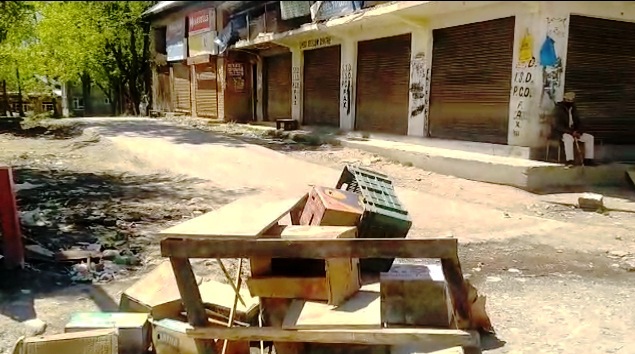In these trying circumstances, there is a need to preserve the idea of community, writes Ikhlaq Qadri

A scare is a normal survival response to a threat. The ongoing Covid-19 pandemic is the “greatest threat to humanity” according to the World Health Organisation (WHO).
As the vaccine is still estimated to be 18 months away, “social-distancing” is the only precaution in hand besides maintaining personal hygiene. In order to flatten the infection curve, all means of mass transport are grounded thus impacting trade across all geographies.
Kashmir is no exception. With the administration actively involved in taking appropriate steps to contain the virus, the society also got engaged. In certain cases, the sections of the society went far ahead in jamming life thus raising question marks over their conduct. At a few places, people barricaded the roads.
A rumour flew in a particular area of Srinagar that a local baker had turned positive. The scare spread quickly. Moments later, people from the adjoining areas came out. They restricted the movement on all interior roads connecting to baker’s shop. Subsequently, a group of men volunteered to stand guard and ensure nobody trespasses. When an enthusiastic masked man was asked the reason, he said, the move was to stop people from buying bread in the area. The news was fake. A few days later the tin sheets dividing the boundaries were removed.
It took a week more to know that a baker was actually tested positive but in Anantnag!
Instances of similar nature were reported from other places as well. There were reports of arguments turning into fistfights. At times the huge boulders were laid to stop the movements.
An audio clip purportedly from an area where the mutton is the mainstay of economic activity went viral. Recorded to warn people, a person asks people not to visit the place for meat. He alleges people visiting may bring the infection. In another viral video clip from the vegetable-rich area of Srinagar, a person requests people not to visit the area for any purchase. The reason, interactions would involve the risk of getting infected.

However, the worst tragedy took place in Sopore. A civil society member, in a video, narrated the horrific details of recent burial. Not known to Kashmir, a deceased who died of Covid-19 was denied the burial space in his ancestral graveyard, according to the details of the video in which a senior member of the local trade organisation was speaking. Later he was buried in his orchard. Invoking religion, the man in the video said people dying in the plague are martyrs. Despite that, the man was denied a final resting place. What if he had not orchard?
Srinagar’s first Covid-19 death was not simple as well. With the lady’s family being in quarantine and the area being declared the Red Zone, the burial was carried out by police completely.
Good to see people doing whatever possible to save lives. Appreciable are the efforts to stop the spread. But while saving humans, humanity should not become the casualty. We should respect the need for isolation but the solution lies in solidarity.
As the word “social distancing” goes out, it needs to be put into perspective. It is a separation of bodies, not souls. As distance does not mean a divide, it is essential to remain connected while we live apart. There is a need to isolate without feeling being isolated.
Humankind has always been vulnerable to epidemics which have killed people. The flu pandemic in 1890 killed more than 10 lakh people across the world. The Asian Flu of 1957 killed another 11 lakh people. Even the Swine Flu of 2010 is reported to have killed almost five lakh people across the world in two years still a vaccine came in the market.
So neither the epidemics are new nor the death, more so in Kashmir. But the precaution is better than cure. The extremes being exhibited by certain sections of the society will increase social fragmentation and weaken society. Understanding the sensitivities, WHO replaced the term “social distancing” with “physical distancing” and issued a bulletin to convey that while maintaining a physical distance was “absolutely essential”, it does not mean that “socially we have to disconnect from our loved ones, from our family.”

Kashmir has a history of volunteerism. Epidemics, floods, conflict, earthquakes, Kashmir wakes up to the call of conscience, always. But the previous disasters were different, both in nature and magnitude. The crisis we are in today is different. The threat is a fellow human being. So the reactions obviously would be different.
But the pandemic should not be given a chance to promote the inequalities in society. Some people depend on the informal economy. Daily earners, destitute, orphans, widows, even the people who can afford luxuries may need help. Word of encouragement is important, even a smile at times. The barricades erected should not deter us from becoming resourceful, helpful and thankful.
In these trying circumstances, there is a need to preserve the idea of community as much as we can. An attempt is required to rethread the ties that bind us together. Volunteerism is the way. Not the vigilantism.
Stay apart, but stay connected.
(This opinion was published in Kashmir Life 12.5)














